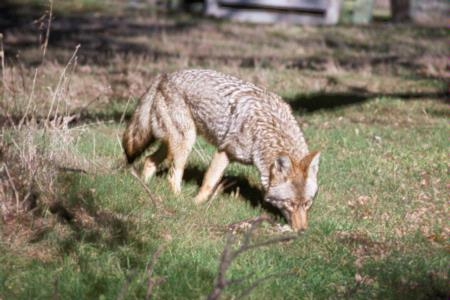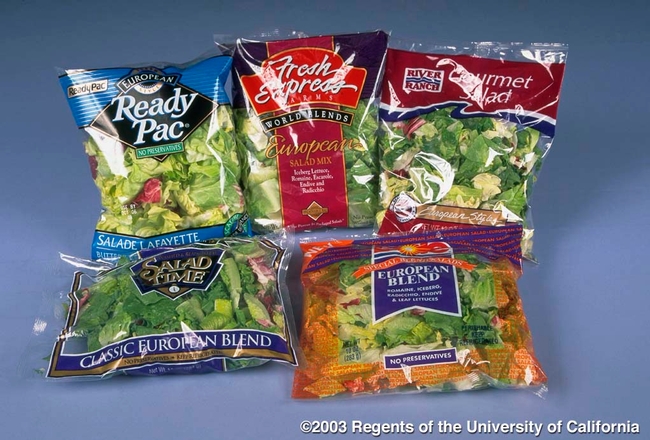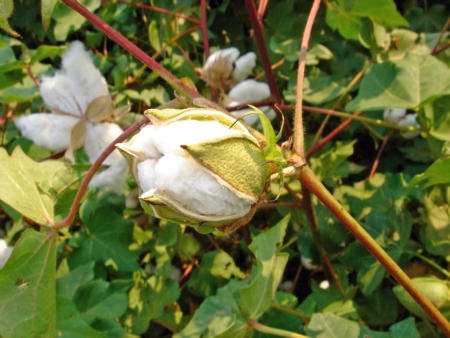Posts Tagged: Eric Mussen
A 'multi-million dollar food fight' heats up, plus other recent news coverage
The reporters called the proposition a "multi-million dollar food fight."
"All of the data that's come out from the American Medical Association and National Academy of Sciences have all agreed that the food products on the market today that are genetically engineered are safe," Van Eenennaam told the reporter
Polls show the 'Yes on Proposition 37' campaign is "way ahead" of those who oppose the initiative, "but there's a long way to go until November," the reporter said.
Vision still pays dividends after 150 years
Sacramento Bee editorial
The Sacramento Bee editorial staff called the 1862 Congress of the United States one of the most productive in American history. One of the reason was it's passage of the Morrill Land-Grant College Act July 2, 1862. The act created the world's best system of public colleges and universities for people of modest means, the editorial said. Previously most Americans had no access to higher education. California took up the land-grant offer in 1864 and the University of California was born – at Berkeley – in 1868. Later, the University Farm would become UC Davis. The Citrus Experiment Station would become UC Riverside.
Building a better, tastier tomato
Lauren Sommer, QUEST Northern California, KQED
Lauren Sommer interviewed Ann Powell, associate researcher in the Department of Plant Sciences at UC Davis, about her finding that the gene that creates "green shoulders" in tomatoes influences the amount of sugar in the ripe fruit. Powell says now that they know about this gene, plant breeders could put it back in commercial varieties.
Bees need a hand, especially in drought
Debbie Arrington, Sacramento Bee
In honor of National Honeybee Day, the Sacramento Bee paid homage to the indispensable pollinator with information about the challenges it faces. Colony collapse disorder, drought and urbanization take their toll. There was some good news: "Bees got through the winter a little better," said Eric Mussen, UC Cooperative Extension specialist, apiculture. "This spring, we saw bigger, earlier and more swarms." However, nationwide, the hot dry summer has made it a tough year for honey production.
Questions about coyotes or bees? UC experts respond
The Napa Valley Register took a closer look at coyotes in western Napa County subdivisions, after neighbors started spotting the canines near their homes.
Reporter Peter Jensen talked to Robert Timm, director of the UC Hopland Research and Extension Center, which is located in Mendocino County. Timm said that researchers track reports of coyote attacks on humans, though no such attacks have ever been reported in Napa County.
For some Sacramento area trees, it's already spring
The Sacramento Bee reported that Bradford pear trees along Sacramento streets are blooming, and sidewalks were littered with flower petals after Monday's storm.
Reporter Debbie Arrington talked to Eric Mussen, UC Cooperative Extension apiculturist with the UC Davis Entomology department, about how the early warm weather might affect pollination and fruit formation.
"Honeybees don't really get confused," Mussen said. "They do act predictably. Anytime the temperature gets above 55 degrees, if there's food somewhere, they'll go get it."
Though petals may fall, Mussen explained that bees will be able to pollinate trees unless storm winds and rain knock entire flowers to the ground, leaving nothing to pollinate.
Re-washing bagged greens may do more harm than good
Re-washing bagged greens may be making salads dirtier, according to a bevy of food safety experts, reported Deborah Schoch in the Los Angeles Times.
Even the cleanest kitchens can teem with harmful pathogens - on cutting boards and in salad spinners, on knives that just sliced raw chicken, on damp, well-used cloth towels.
"In brief, consumers don't wash up very well and may contaminate produce due to dirty hands and dirty sink," emailed Christine M. Bruhn, director of the Center for Consumer Research at UC Davis. That's especially a problem with salad greens, since they never get cooked.
Schoch spoke to food experts from Kansas State University and the University of Maryland who also recommended pre-washed greens not be re-washed.
California apprenticeship building future producers
Amy Trinidad, Sheep Industry News
The American Sheep Industry Association is teaming up with the state sheep associations to expand the Let’s Grow initiative to include mentor programs for beginning sheep producers.
“There is a real movement as far as people wanting to get back to the land. In some ways, it’s like the 1960s and 70s, only with a whole bunch of bigger challenges,” says Roger Ingram, University of California Cooperative Extension farm advisor.
Shepherds need to know how to run animals in a variety of environments, be able to identify common and uncommon pasture and range plants, know range nutrition, identify potential poisonous plants, be able to quickly asses the health of the flock and be able to take the appropriate steps in field conditions to fix problems, Ingram said.
Mild winter shifts the start of the growing season
Heather Hacking, Chico Enterprise Record
The lack of rain has meant some Butte County almond growers have already irrigated twice, and some are starting a third run with the water. They would rather not water at all, and often don't need to this time of year, said Joe Connell, UC Cooperative Extension farm advisor.
It can cost about $40 to apply 12 inches of water to one acre, he said. Growers will think carefully before pumping if it looks like another storm is on the way. The most recent rain provided water to the first foot of soil, depending on the soil conditions. But almond growers will want the soil irrigated 3 to 4 feet down by bloom time.
Almond trees in the area will likely begin to bloom around Valentine's Day this year, about a week earlier than normal.
Yuba-Sutter beekeepers abuzz on research
Jonathan Edwards, Orland Press Register
Losing bees to colony collapse disorder is not good for Yuba-Sutter. Beekeeping brought in about $3.9 million to area beekeepers in 2010, the last year for which data is available. On average, beekeepers have lost nearly one-third of their colonies each year since 2006.
That number likely skyrocketed last year as dwindling colonies drove higher prices. A shrinking supply of vibrant hives nearly doubled the price of a colony, from $33 to $58 between 2009 and 2010, according to the Sutter County Crop Report. The price nearly tripled again and is holding at about $150 a colony, said Eric Mussen, an apiculturist with UC Cooperative Extension at UC Davis.
"It just shot up," he added.
Pest threats 'overblown'
The board agreed to revisit the 2008 regulation that prevents cotton growers from planting in the same field three years in a row if the level of verticillium wilt is detected in 3 percent or more of the crop.
Doug Munier, farm advisor for University of California Cooperative Extension, said verticillium dahliae exists in native valley soils and is spread by movement.
"Verticillium was a minor problem with cotton was first planted in the mid-1990s and it is still a minor problem after 17 years of production," he said.
New bee threat more media hype than reality
Wayne Anderson, The Washington Times
Government officials, leading bee experts and average beekeepers around the country say the strange discovery of a deadly bee parasite fly that makes honeybees act "zombie-like" is not seen nationwide — but only in a recently published San Francisco State University study. And some even question the veracity of the discovery itself.
The parasite fly is a long-time resident of California and a known nemesis to other bugs besides honeybees, the article said.
“They’ve been known to infest or parasitize bumblebees for some time all over the country,” said Eric Mussen, California State bee specialist and professor at the University of California, Davis. “It’s not new. We’re aware of it. I don’t believe it’s a terribly important thing to honeybees as a whole.”
No explanation yet for mysterious bee deaths
Even though scientists have been studying colony collapse disorder of honeybees for five years, the relentless bee mortality still has them mystified, according to a segment that aired on PBS' NewsHour yesterday.
"We really don't seem to have accomplished a whole lot, because we're still losing, on an average, approximately 30 percent or more of our colonies each year. And that's higher than it used to be," UC Cooperative Extension bee expert Eric Mussen told reporter Spencer Michels. "Only 25 percent of the beekeepers seem to have this CCD problem over and over and over. The other 75 percent have their fingers crossed and say, I don't know what this is, but it's not happening to me."
Michels outlined some of the research into the possible causes of persistent bee decline. At UC Davis, scientists are trying to find ways to improve bee health by changing what they eat and selectively breeding healthier, disease-resistant bees. At UC San Francisco, scientists are extracting DNA or RNA from healthy bees to analyze what viruses or bacteria are present.
"We found four new viruses in this study, and one of them was so frequent, there was more of that virus present than every other virus that we have know about put together," said UCSF's Charles Runckel.
A beekeeper featured in the program said he maintains healthy bee colonies by keeping them "forever young." Randy Oliver splits his hives every year, taking half the bees out and starting a new hive.
"That simple act of splitting gives the bees a fresh start. And, in nature, that's what they do. Bees -- bees reproduce frequently. They swarm every spring, and they give themselves fresh starts. And that's what beekeepers are tending to do, too," Oliver explained.

PBS




